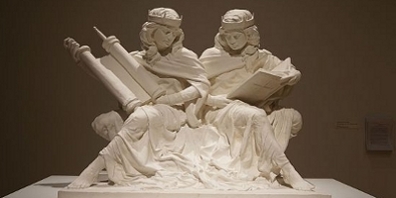JEWISH-CHRISTIAN POLEMICS IN EARLY MODERN ITALY

A.) Polemical treatises listed in order of the author's name
Seventeenth century
The disputation took place in April 1617 in Ferrara between the author and a Jesuit priest named Alfonso Caracciolo.
Yohanan GHIRON (1646-1716): Tziyyun al-tumat ha-kever
Record of a disputation between the author and some catholic theologians.
Shaul ben Joseph MERARI (at the turn of the eighteenth century): Herev pifiyyot
Yehudah Aryeh (Leone) me-MODENA (1571-1648): Magen va-herev
The text is also known under the name of 'Emunat Hachamim'.
Eighteenth century
The treatise is sometimes entitled as "Pas yeda di-katva" /Dan. 5:5./ or in Latin as Animadversiones in Evangelia or Argumenta contra narrationes apostolorum. In some manuscripts the text is attributed to Briel's pupil, Yehoshua ben Tzion (Salvador) SEGRÉ (1709-1798) and entitled as the second part of his Asham talui (Asham talui B, see below). In fact, Segré seems to have only collected and supplemented Briel's notes.
Mordechai (Marco) ben Nathan LUZZATTO (1720-1790, translator): Tzeriah bet El
A Hebrew translation of Fortaleza del Judaismo y confusion del estrano, formerly attributed to Abraham Ger of Cordova (Escudero Lorenzo). The original work was written in Spanish in the 17th century and was translated into Hebrew and Italian in the 18th century.
Simson Cohen MODON (1679-1727): Yushpal elil...
An Anti-Christian polemical parody following the text of Yigdal.
Menachem MONTEBAROCCI (eighteenth century): Teshubot le-hashiv el sheelot she-shoalim ha-notzrim
Aharon Moshe PONTREMOLI's (1702-?) Disputation entitled formerly "Sefer teshubot al ha-tekufot..."
Jonah Ha-Cohen RAPA (at the turn of the eighteenth century): Pilpul al zeman, zemanim, zemanehem
Yehoshua ben Tzion (Salvatore Benedetto) SEGRÉ (1709-1798): Asham talui (1731)
A revised edition of the work was prepared by the author in 1771.
Yehoshua ben Tzion (Salvatore Benedetto) SEGRÉ (1709-1798): Even gilayon o Asham meilot
A polemical composition against Fabiano Fioghi's Dialogo della Fede.
Cigognia STROZZI: Hibbur al-ahdut ha-El
A Hebrew language translation of several extracts from an unknown book of the theologian Dr. Cigognia Strozzi on the unity of God, based on the writings of Lactantius, Cicero etc.
Matatyahu Nissim (Donato) TERNI (1745-1810): Derech emunahA polemical drama written in 1770 and staged in Pesaro on Pentacost 1782 by the Society of "Supporter of the Fallen."
Aharon Hayyim (Vita) VOLTERRA (d. 1763): Makkot le-kesil meahAn anti-Christian poem in 100 verses with a commentary written by the author
Aharon Hayyim (Vita) VOLTERRA (d. 1763): Rosh amanahA long polemical treatise
B.) Anonymous works whose region of provenance or/and date has not yet been identified with certainty. Items are listed in alphabetical order.
Aton olam... An anonymous polemical parody following the text of the Adon olam, starting with the words "Aton olam..." Beni, mari... An anti-Christian comic poem, starting with the words "Beni, mari..." Beri, lecha emet barur...An anti-Christian comic poem starting with the words "Beri, lecha emet barur..." The poem is sometimes attributed to Simson Cohen Modon, sometimes to Yehoshua ben Tzion Segré.
Divré ha-Evangelyav asher devarav machishin zeh et zeh Divré polmus anti-notzritThe text is also known under the title of "Vikkuah neged ha-Evangelyon"
Hibbur neged ha-natzrutThe text seems to be identical with the second part of "Shalosh averot" (See below)
Hibbur neged ha-notzrimThe text starts with an explanation of the Book of Daniel, chapter 2. Mauro Perani identified the text with the last section of a polemical writing penned by Mosheh Shlomo da Salerno (thirteenth century). If the two texts are indeed identical, the item should be cancelled from our list.
Hibbur polmusi anti-notzriSome part of the treatise seems to be identical with the text entitled "Pirqé polmos jehudi-notzri" (See below) According to Benjamin Richler, the Parma ms. originated in the sixteenth century. If Richler's assumption is right, both items should be cancelled from our list.
Ktzat pesuqim she-mefarshim otam kefi-daatamThe text is also known under the title of "Vikkuah neged ha-Evangelyon"
Le-corech ma telunotecha...A humorous anti-Christian poem starting with the words "Le-corech ma telunotecha..." The opening sentence of the poem seems to be identical with the second strophe of the poem with the starting words "Beni, mari...". (See above)
Liqquté polmus Maamar ktzar neged ha-natzrut be-tzurah shel dialog ha-mathil be-milim: Kol ha-neviim amru she lo lismoa le-Yeshu.The treatise is sometimes entitled "Hibbur neged ha-natzrut bi-tzurat du-siah".
Madon olam...An anonymous polemical parody following the text of the Adon olam, starting with the words "Madon olam..." The poem was attributed to Yehoshuah Segré by Meir Benayahu.
Niqtal elil...An anonymous polemical parody following the text of the Yigdal, starting with the words "Niqtal elil..."
Pirqé polmus jehudi-notzriThe treatise seems to be identical with a portion of the text entitled "Hibbur polmusi anti-notzri" (See above)
Sefer ha-nitztzahonot Sehok olam... Shalosh averot...An anonymous anti-Christian writing starting with the words "Shalosh averot..."
Sheelot u-teshubot meorebot me-zeh la-zeh u-me-zeh la-zeh ha-yehudim ve-ha-notzrim Sheloshim sheelot (teshubot) neged ha-notzrimThe text seems to be identical with the treatise entitled "Sheloshim sheelot she-shaal jehudi le-mumar ehad...", alternatively it might be a later, revised version of it, because the treatise "Sheloshim sheelot she-shaal jehudi" is extant in two allegedly sixteenth-century manuscripts. If the two texts are identical, and the two manuscripts are truly written in sixteenth century, the item should be cancelled from our list.
Taanot neged ha-notrzimMauro Perani identfied the text with a section of a polemical writing penned by Mosheh Shlomo da Salerno (13th century). If the two texts are identical, the item should be cancelled from our list.
Teshubat ha-minim I. Teshubat ha-minim II. Teshubat ha-minim III. or Hokahat amitut ha-natzrut. Teshubot la-minim Vikkuah beyn Jehudi ve-komer notzri be-shem Don Selvano Tzerer (or Rossi) Vikkuah neged ha-natzrut Vikkuah shel hacham notzri Yeshua me-Natzriya avar datenuA comic poem against Jesus
Zikronot ishiyyim al-maasar we-hakirah shel koteb almoni be-Ancona
© Karoly Daniel Dobos: Jewish-Christian Polemics in Early Modern Italy
Research that enabled the preparation of this bibliography was sponsored by the Anniversary Fund of the National Bank of Austria (Jubiläumsfonds der Österreichischen Nationalbank, project number: 16099: "Jüdisch-christiliche Polemik: Akkulturation und Modernisierung")
The webpage was created by Karoly Daniel Dobos